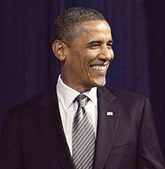BLOG
Mitt Romney's Crazy Comments on Medical Marijuana
The instant I write something suggesting that Romney wouldn't be any worse than Obama on medical marijuana, along comes Romney flipping out on a reporter for merely asking about it. The fun starts at 2:10:
What's the REAL Reason for Obama's Medical Marijuana Crackdown?
[inline:Obama1.jpg align=right]There's an interesting article at The Week looking at some different theories regarding the reasons behind Obama's medical marijuana crackdown. You can choose from one of more of the following:1. He's trying to look tough because he believes – rightly or wrongly – that he could be vulnerable to being labeled "soft on crime" during the election.2. He doesn't think the "marijuana vote" is strong enough to have a meaningful impact on him politically.3. The medical marijuana industry got too big too fast, forcing the federal government to intervene.
Medical Marijuana Update
The national battle over medical marijuana is heating up, Connecticut is about to become the 17th medical marijuana state, and state and local b
House to Vote on Defunding Medical Marijuana Raids [FEATURE]
In a bid to snuff out the federal medical marijuana crackdown, four US congressman have introduced an amendment that would bar the Justice Department from spending money to do so.
Charlottesville Says Decriminalize or Regulate Marijuana
The city council in the Virginia college town of Charlottesville had adopted a resolution calling on the state to consider decriminalizing or regulating marijuana, but balked at adding lowest law e
Dutch "Weed Pass" Plan Hitting Bumps
The Dutch move to bar foreigners from cannabis cafes on the southern border has been met by coffee shop closures in protest, legal action, and police who seem to have better things to do.
Would Romney be Worse for Medical Marijuana Than Obama?
My latest Huffington Post piece takes a look at the argument that medical marijuana advocates should support Obama, despite what he's done, because Romney would be so much worse. Check it out and let me know what you think.
What Happens AFTER You Refuse a Police Search?
Flex Your Rights has been working for many years now to educate everyone we can about the importance of refusing police searches and otherwise knowing and asserting your constitutional rights when confronted by police. Unfortunately, even if you handle a police encounter perfectly, things can still get pretty ugly. This video discusses how to handle some of the challenges you can run into after asserting your rights:
Connecticut Bill to Strengthen Racial Profiling Ban Passes
A bill that will revive and strengthen Connecticut's largely dormant racial profiling law has passed the legislature, and Gov.
Did You Know? Legal Drinking Age 138 Countries, from ProCon.org
ProCon.org is a set of in-depth web sites presenting information and views from on current issues, several with relevance to drug policy.
Connecticut to Become 17th Medical Marijuana State
Connecticut is about to join the ranks of the medical marijuana states, but in a bid to fend off the feds, its new law is one of the most tightly-drawn yet.
Colorado Per Se Drugged Driving Bill Moving
A bill that would label drivers impaired if they have more than five nanograms of THC per milliliter in their blood even if they are not ac
DEA Forgets Student in Cell, Pols Want Answers
DEA agents arrested a San Diego college student in a drug bust, then forgot about him, leaving him in a holding cell for five days.
Pelosi Condemns Medical Marijuana Crackdown
House Minority Leader Nancy Pelosi has joined the chorus of critics condemning the Obama administration's crackdown on medical marijuana businesses.
MSNBC.com Article on DEA "Lost Prisoner"
I'm quoted, fairly extensively, in an article appearing on msnbc.com about Daniel Chong, the student who almost died handcuffed in a detention cell after DEA personnel forgot about him for five
Is the D.A.R.E. Program Good for America's Kids? (K-12), from ProCon.org
Drug War Chronicle is running a series of "Did You Know?" items highlighting items from ProCon.org. This is the second installment.
Nancy Pelosi Condemns Federal Attacks on Medical Marijuana
Yesterday we reported that advocates had presented House Minority Leader Nancy Pelosi with a petition asking her to help end the federal crackdown on medical marijuana.
Drug Czar Denies that Marijuana Users Are Arrested and Forced into Treatment
[inline:drugczar.jpg align=right]On Tuesday, I had a chance to question the drug czar about his enthusiasm for drug treatment at an event in D.C. Mike Riggs at Reason has good coverage of the exchange.
This is Maria. She Will end the War on Drugs.
I saw this at DrugWarRant and had to pass it along. Very powerful. Watch the whole thing.
Pagination
- First page
- Previous page
- …
- 21
- 22
- 23
- 24
- 25
- …
- Next page
- Last page






